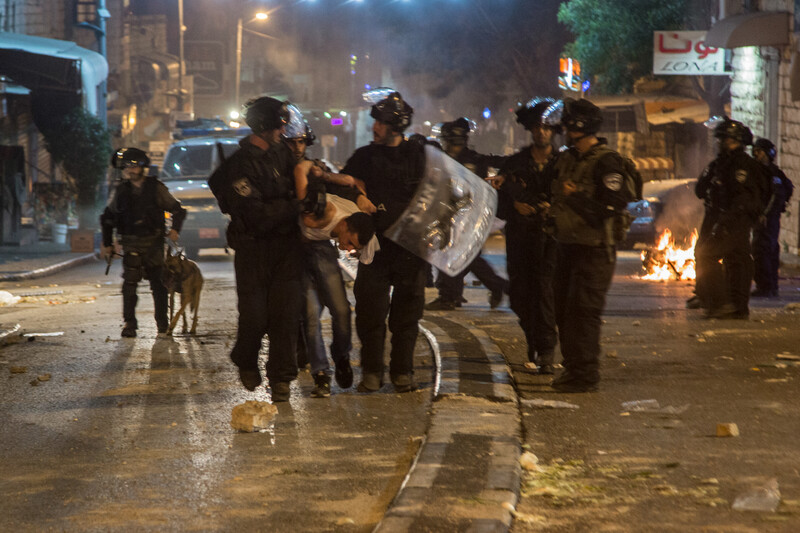Rights and Accountability 2 November 2016

Israeli has held 20 of its citizens without charge or trial in the past year, most of them Palestinians.
ActiveStillsIsrael’s government is seeking greater use of detention without charge or trial, at a time when at least three Palestinian prisoners are on hunger strike against the practice.
Administrative detention, as the practice is known, has been widely used by the Israeli military against Palestinians living in the occupied West Bank. About 700 Palestinians are being held in Israeli prisons without charge, according to the latest data.
The use of administrative detention against Palestinian citizens of Israel has increased considerably in the past 12 months.
New data on the administrative detention of citizens of Israel has been supplied to Israel’s parliament, the Knesset.
The data indicates that the number of administrative detention orders issued for citizens of Israel jumped from zero in 2014 to 20 within the past year. Most were issued against Palestinian citizens of Israel.
Wider powers
Last week, the Israeli government submitted a proposal to give the defense minister wider powers to detain citizens of the state without charge or issue other restrictions on their freedom.
Administrative detention in Israel is governed by an “emergency” regulation. Israel has been under a “state of emergency” – renewed annually by the Knesset – since its establishment in 1948.
The proposal submitted last week would replace the “emergency” regulation with a permanent one. It was originally part of a major “counterterrorism” law designed to criminalize Palestinian political activity, which was approved by the Knesset in June. But the proposal was split off from that law to allow for further discussions, according to the Tel Aviv daily Haaretz.
In addition to indefinite detention without charge, the new proposal would allow the defense minister, currently Avigdor Lieberman, to ban an individual from certain professions, confine them to a specific location and forbid contact with certain people on the basis of “national security or the public safety.”
Administrative detention orders would be limited to six months, and other administrative restriction orders to one year, according to Haaretz. The defense minister would be able to indefinitely renew such orders with the authorization of a court.
A legal opinion prepared for the Knesset’s constitution committee has expressed concerns about the new proposal.
“The authority to restrict a person’s freedom of movement and freedom of occupation, and to intervene in every detail of his life, is far-reaching,” the opinion states. “Consideration should also be given to the fact that restrictive orders won’t be imposed as an alternative to detention orders, but will expand the circle of people supervised by the security services.”
“No justice”
In a new video, the Palestinian prisoner rights group Addameer denounces the practice of administrative detention:
“Every individual has the right to a fair trial,” Mahmoud Hassan, an Addameer representative, says in the video. “However, in terms of administrative detention, there is no justice or fair trial, as the detainee is held based on secret information.”Out of the nine Palestinian prisoners currently on hunger strike, three are protesting their administrative detention. Four are protesting their solitary confinement and two are protesting the mistreatment of Palestinian women in Damon prison.
The Ma’an News Agency has reported that Anas Shadid and Ahmad Abu Fara have suffered damage to their health, having been on hunger strike for more than a month. Both were recently transferred to the Ramla prison clinic.
Samer Issawi, who went on a partial hunger strike for 266 days in 2013, is again refusing food. This time he is striking in solidarity with his sister Shireen Issawi and the other women in Damon prison.
Damon is located in the far north of present-day Israel, requiring relatives to travel very far to visit their loved ones and the prisoners to travel far for their court hearings.
Samer Issawi is demanding that his sister and the other female prisoners be transferred to a facility closer to the courts in which they are tried, that they are provided with adequate medical treatment and given access to Doctors Without Borders, an international humanitarian group also known by its French acronym MSF.
On 26 October, Israeli forces raided the home of Salah Khawaja, an activist living in the West Bank city of Ramallah.
Khawaja works for the BDS National Committee, which coordinates the Palestinian boycott, divestment and sanctions campaign against Israel, as well as the organization Stop the Wall.
Khawaja has been held under a 15-day interrogation order issued by an Israeli military court. He has been denied attorney visits until now.





